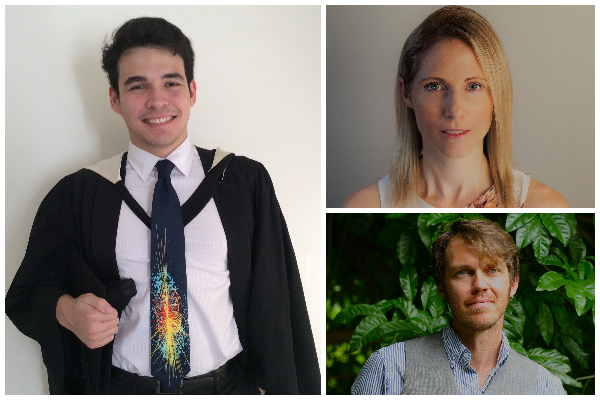
PhD candidate Oliver Bellwood from the School of Mathematics and Physics will represent the Faculty of Science in the UQ final of Three Minute Thesis (3MT) on 16 September 2020.
Oliver’s 3MT presentation ‘The 8 minute abs of materials physics’ won a tightly contested final against 11 other PhD candidates from across the Faculty.
Oliver is a theoretical physicist whose research on utilising magnetically scattered laser light to study magnetic materials has the potential to fast-track advancements in computer hardware, battery technology and nanotechnology, by lowering the cost and time frames needed for performing vital material analysis.
“Chemists and materials scientists are discovering new materials weekly but using them to make better computer chips or smaller, more efficient phone batteries takes thousands to millions of research hours to actualise,” he said.
“Lowering the barrier to entry for organisations to research new materials will potentially result in materials entering the technological market sooner and at a lower cost.
“This means the community could benefit from greater access to enhanced technology in devices such as electronics or medical equipment.”
An 80,000 word PhD thesis would take 9 hours to present. But in 3MT, PhD candidates have only three minutes to effectively explain their research to a non-specialist audience.
Due to COVID-19, this year’s 3MT competitions are being run as a virtual competition. Instead of presenting their research live to a panel of judges, this year’s entrants were required to submit pre-recorded video presentations. This meant they had to film their own presentations using a phone, computer, or camera.
Scott Spillias from the School of Environmental and Earth Sciences was runner-up with his presentation on 'The seaweed revolution'.
Scott says he enjoyed the challenge of having to communicate his ideas in a simple, short, engaging way.
“For me, the iterative process of crafting and re-crafting my 3MT presentation was eye-opening to how even slight changes in a choice of word or a gesture can produce a huge change in the impact of your overall message,” he said.
Kate Dutton-Regester from the School of Agriculture and Food Sciences was awarded the People’s Choice Winner and presented her research on 'A poo’s purpose: understanding the reproduction of echidnas' in the UQ 3MT Wildcard Competition held last week.
Kate’s motivation for taking part in 3MT was to challenge herself and improve her presentation skills.
“Participating in the 3MT has taught me how to present my research in a clear and succinct way which is important in both academia and when engaging with the public,” she said.
The Faculty of Science 3MT finalists were:
Kieran Ison (School of Agriculture and Food Sciences) – The dairy cows’ buffet: leaves, leaves and more leaves!
Jessa Thurman (School of Biological Sciences) – Bringing diversity to a green desert
Isaac Towers (School of Biological Sciences) – Plants, species diversity and offices
Ras Baizureen Roseli (School of Chemistry and Molecular Biosciences) – Towards rapid drug discovery
Prashamsa Koirala (School of Chemistry and Molecular Biosciences) – Development of vaccine antigen against GAS bacterium
Alice MacDonald (School of Environmental and Earth Sciences) – Using volcanic crystals to explore the unknown
Daniel Fryer (School of Mathematics and Physics) – The big black box
Hao-Yu Shih (School of Veterinary Science) – Your personality affects the leash tension when walking dogs
Philip Mshelbwala (School of Veterinary Science) – Towards zero dog mediated rabies deaths in Nigeria by 2030
About 3MT
The first 3MT competition was held at UQ in 2008. Fast-forward 12 years and 3MT competitions are now being held in more 900 universities across more than 85 countries worldwide.
3MT is an opportunity for PhD candidates to develop their presentation and research communication skills in a supportive environment, whilst showcasing their amazing research to a wider audience.



